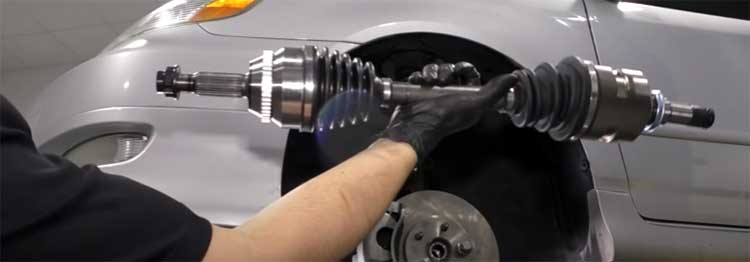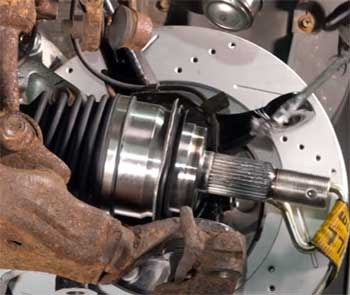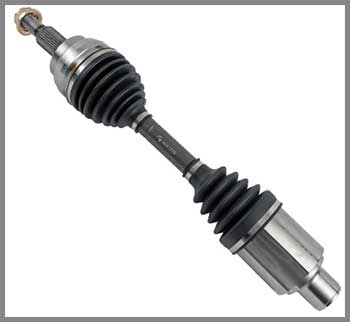When it comes to keeping your car running smoothly, a reliable CV axle is non-negotiable. After wrestling with worn-out axles and researching countless options, I landed on TRQ CV axles, and I’m convinced they’re worth your attention.
These axles deliver a balance of quality, affordability, and performance that’s hard to beat for the everyday driver. In this article, I’ll share my firsthand experience, break down the pros and cons, offer maintenance tips, and compare TRQ to other brands.
By the end, you’ll see why TRQ is a solid choice for your vehicle.
My Hands-On Experience With TRQ CV Axles

A few months back, my 2012 Toyota Camry started making that dreaded clicking noise when I turned sharp corners—a telltale sign of a failing CV axle. The vibrations during acceleration didn’t help either, and I knew it was time for a replacement.
I’d heard mixed things about aftermarket parts, but with OEM axles costing a small fortune, I decided to give TRQ a shot after reading some positive chatter online. I ordered the TRQ Front CV Axle Shaft Assembly Set from 1A Auto, and let me tell you, the process was smoother than I expected.
The package arrived in less than a week, neatly packed with both driver and passenger side axles. The first thing I noticed was the build quality—sturdy steel shafts, well-sealed neoprene boots, and a reassuring heft that didn’t scream “cheap.”
Installation was a breeze, thanks to the precise fitment and the detailed instruction sheet included. I’m no professional mechanic, but with a YouTube tutorial (shoutout to 1A Auto’s videos) and some elbow grease, I had both axles swapped out in about two hours.
The splines aligned perfectly with my Camry’s hub, and the included axle nuts were a nice touch.
Once installed, the difference was night and day. The clicking vanished, and my car felt like it had regained its youth—smooth cornering, no vibrations, and a quiet ride even on rough roads.
I’ve put about 5,000 miles on these axles so far, including a road trip through some winding mountain roads, and they’ve held up flawlessly. The only hiccup?
A slight grease smudge on one boot during shipping, but it was cosmetic and didn’t affect performance. Honestly, for the price, I was impressed by how well these axles performed right out of the box.
What really stood out was how TRQ made the whole experience user-friendly. The fitment was spot-on, and the included instructions were clear enough for a novice like me to follow.
I’ve since recommended TRQ to a friend who drives a 2018 Nissan Versa, and she reported the same smooth installation and performance. Her car had been making weird noises for months, and after swapping in TRQ axles, it’s been quiet and reliable.
For anyone hesitant about aftermarket parts, my experience with TRQ should put your mind at ease—they deliver where it counts.
What Makes TRQ CV Axles Stand Out?

- Affordability Without Cutting Corners
One of the biggest reasons I’m a fan of TRQ is their price point. You’re getting a high-quality product without the gut-punch cost of OEM parts. For my Camry, the TRQ axle set was about a third of the price of Toyota’s factory axles, yet the performance feels comparable.
The axles are manufactured in state-of-the-art facilities, and TRQ’s commitment to rigorous testing ensures they meet or exceed industry standards. I’ve read horror stories about budget axles failing within months, but TRQ’s quality control seems to keep those issues at bay.
You’re not paying for a fancy brand name, but you’re still getting a reliable product.
- Precision Fitment for Hassle-Free Installation
If you’ve ever struggled with aftermarket parts that don’t quite fit, you’ll appreciate TRQ’s attention to detail. These axles are designed to match OEM specifications, so you don’t have to wrestle with mismatched splines or force anything into place.
For me, the installation was plug-and-play, and I’ve heard similar feedback from others on forums like Reddit and Toyota Nation. Whether you’re a DIYer or taking it to a mechanic, the precise engineering saves time and frustration.
Plus, TRQ’s vehicle-specific fitment guides make it easy to ensure you’re ordering the right part for your car.
- Durability That Holds Up
TRQ axles are built to last, thanks to their high-quality materials. The neoprene boots are a standout feature—flexible yet tough, they resist cracking and tearing even under harsh conditions.
I drive on some pretty beat-up roads, and these boots have shown no signs of wear. The steel shafts are heat-treated for strength, and the CV joints are packed with high-quality grease that can handle extreme temperatures.
After 5,000 miles, I haven’t noticed any leaks or noises, which is a testament to their durability. For the average driver, these axles feel like they’ll go the distance.
- Smooth and Quiet Performance
Nothing ruins a drive like a noisy or shaky axle. TRQ axles are designed to minimize vibrations and noise, and I can vouch for their smooth operation. Whether I’m accelerating hard or navigating tight turns, the ride is steady and quiet.
This is especially important if you, like me, spend a lot of time on uneven terrain or in stop-and-go traffic. The CV joints are precision-engineered to reduce friction, which not only improves your driving experience but also extends the axle’s lifespan.
It’s the kind of performance that makes you forget you’re not using OEM parts.
- Lifetime Warranty for Peace of Mind
Another perk that sealed the deal for me was TRQ’s lifetime warranty. It’s rare to find an aftermarket brand that stands behind their product like this. If something goes wrong—say, a boot tears or a joint fails—you’re covered.
I haven’t had to use the warranty yet, but knowing it’s there gives me confidence. 1A Auto’s customer service is also a big plus; they’re quick to respond and make returns or exchanges painless. For anyone worried about aftermarket reliability, this warranty is a game-changer.
The Downsides of TRQ CV Axles

- Occasional Boot Quality Concerns
While I had no issues with my TRQ axles, some users have reported problems with the rubber boots degrading faster than expected. In my research, a few folks on forums mentioned small tears or grease leaks after a year or so, especially in extreme climates.
This isn’t a widespread issue, but it’s worth noting if you live somewhere with brutal winters or scorching summers. Inspecting the boots regularly can help catch any issues early, but it’s a slight mark against TRQ’s otherwise solid reliability.
- Not a True Manufacturer
Here’s something that gave me pause: TRQ isn’t a manufacturer in the traditional sense. They’re a house brand for 1A Auto, which means they source parts from various suppliers and rebrand them.
This isn’t necessarily a bad thing—TRQ’s quality assurance seems top-notch—but it means you’re relying on 1A Auto’s oversight rather than a dedicated factory. For me, this didn’t impact performance, but if you’re a stickler for knowing exactly where your parts come from, this lack of transparency might bug you.
- Slightly Higher Price Than Budget Competitors
TRQ axles are affordable compared to OEM, but they’re not the cheapest aftermarket option out there. Brands like GSP or Detroit Axle often come in at a lower price point. For my Camry, TRQ was about $30 more than the cheapest alternatives.
That said, I think the extra cost is justified by the quality and fitment, but if you’re on a super tight budget, you might be tempted to go with a bargain brand. Just be warned—cheaper axles often come with shorter lifespans or fitment headaches.
- Limited Availability for Some Vehicles
One potential downside is that TRQ’s catalog, while extensive, doesn’t cover every vehicle out there. I was lucky that my Camry was a perfect match, but if you drive a less common model, you might need to double-check compatibility.
I saw a few posts on SwedeSpeed about Volvo owners struggling to find TRQ axles for their cars. It’s not a dealbreaker, but it’s something to keep in mind when shopping. Always verify fitment before ordering to avoid any surprises.
Tips To Keep Your TRQ CV Axles In Top Shape
- Regular Boot Inspections

Your CV axle’s boots are its first line of defense, protecting the joints from dirt and moisture.
I make it a habit to check mine every oil change, about every 5,000 miles.
Look for cracks, tears, or grease leaks—any of these can spell trouble if left unchecked.
If you spot a small tear, you might be able to replace just the boot, which is way cheaper than a new axle.
A flashlight and a quick peek under your car are all you need.
Trust me, catching issues early can save you a ton of hassle.
- Keep the Joints Greased
The CV joints rely on high-quality grease to stay smooth and functional. TRQ axles come pre-packed with good grease, but over time, it can break down, especially in harsh conditions.
If you’re doing a boot replacement or notice any issues, consider repacking the joints with moly-based CV joint grease. I haven’t had to do this yet, but my mechanic buddy swears by it for extending axle life. Just make sure you use the right grease—generic stuff won’t cut it under high heat or stress.
- Avoid Harsh Driving Conditions When Possible
I get it—sometimes you can’t avoid rough roads or aggressive driving. But if you want your TRQ axles to last, try to go easy on them. Potholes, curbs, and off-road adventures put extra stress on the joints and boots.
I learned this the hard way when I hit a nasty pothole and started hearing faint clicks before my axle swap. If you’re stuck on bad roads, slow down when you can—it’ll give your axles a fighting chance to hit that 100,000-mile mark.
- Torque Everything Properly
When installing your TRQ axles, make sure everything is torqued to spec. I borrowed a torque wrench from a friend to tighten the axle nuts, and it made a big difference in ensuring a secure fit. Over- or under-tightening can lead to vibrations or premature wear.
TRQ includes a spec sheet with their axles, so follow it to the letter. If you’re not doing the install yourself, double-check that your mechanic isn’t rushing through this step—it’s more important than you might think.
- Clean and Inspect During Wheel Maintenance
Any time you’re working on your wheels—whether it’s rotating tires or replacing brakes—take a moment to inspect your axles. A quick wipe-down with a rag can remove dirt or debris that might damage the boots.
I noticed some road grime buildup near my passenger-side axle during a tire rotation and cleaned it off before it could cause trouble. It’s a small step, but it keeps your axles in fighting shape and lets you spot issues before they escalate.
- Listen for Warning Signs
Your car will tell you when something’s wrong if you pay attention. Clicking noises when turning, vibrations during acceleration, or a greasy mess under your car are all red flags. I caught my old axle’s issues early because I noticed the clicking during low-speed turns.
If you hear or feel anything odd, don’t ignore it—check your axles or take them to a mechanic. Early intervention can prevent a small problem from turning into a costly repair.
How TRQ Stacks Up Against Other Brands?
- Cardone: Reliable but Hit-or-Miss Quality Control

Cardone is a big name in the auto parts world, known for both new and remanufactured CV axles.
Their axles are solid, with high-quality grease and pneumatically crimped boots that rival TRQ’s.
I considered Cardone for my Camry, but I heard too many stories about inconsistent quality control—missing parts, defective units, or axles that vibrated right out of the box.
TRQ, in my experience, felt more consistent, and the price was slightly lower for comparable performance.
If you’re set on Cardone, their remanufactured axles can be a budget-friendly option, but you’re rolling the dice on refurb quality.
- TrakMotive: Premium Materials at a Premium Price
TrakMotive axles are often praised for their premium neoprene boots and precision engineering. They’re a step up in price from TRQ, sometimes by $50 or more, but you get what you pay for with their durability and quiet operation.
I was tempted by TrakMotive’s reputation, but their limited availability for my Camry and the higher cost pushed me toward TRQ. If you drive a less common vehicle or prioritize absolute top-tier materials, TrakMotive might edge out TRQ, but for most folks, the difference isn’t worth the extra cash.
- GSP: Budget-Friendly but Short-Lived

GSP axles are the bargain-bin option, often significantly cheaper than TRQ. I looked at them to save a few bucks, but online reviews scared me off—too many complaints about short lifespans and vibrations after just a few thousand miles.
TRQ’s axles, while pricier, offer better longevity and smoother performance. If you’re in a pinch and need a quick fix, GSP might do the job, but for a daily driver like mine, TRQ’s balance of cost and quality is a safer bet.
- Drive Tech America (DTA): Solid but Limited Range
DTA axles are known for their high-quality steel and heat-treated components, and they come with a decent warranty. I didn’t go with DTA because they didn’t have a set for my Camry at the time, which highlights their biggest drawback: a limited product range.
When available, DTA axles perform well, but TRQ’s wider compatibility and slightly lower price made them the better choice for me. If your vehicle is on DTA’s list, they’re worth considering, but TRQ’s availability and fitment precision give it an edge.
- Detroit Axle: Cheap but Risky
Detroit Axle is another budget brand that caught my eye, but the reviews were a mixed bag. Some users love their low prices and easy installation, but others reported failures within months or poor fitment.
I didn’t want to risk a bad part, especially since I rely on my car daily. TRQ’s reputation for consistent quality and 1A Auto’s solid customer service gave me more confidence. If you’re selling a car or need a temporary fix, Detroit Axle might work, but TRQ is the smarter long-term investment.
- APWI: Decent but Not Always Consistent
APWI (Automotive Parts Warehouse Inc.) is another player in the aftermarket CV axle game. Their axles are generally well-regarded for their neoprene boots and affordability, but some users report fitment issues or early wear.
I didn’t consider APWI for my Camry because TRQ’s reviews were more consistently positive, and the lifetime warranty tipped the scales. APWI is a good middle-ground option, but TRQ’s smoother installation and broader compatibility made it the clear winner for me.
Frequently Asked Questions (FAQ)
From my experience, TRQ is a solid choice for aftermarket CV axles. They’re not OEM, but they offer impressive quality for the price. The precise fitment, durable materials, and smooth performance make them reliable for most drivers. While some users report boot issues in extreme conditions, regular maintenance can mitigate this. TRQ’s partnership with 1A Auto also means good customer support and a lifetime warranty, which adds peace of mind. If you’re looking for affordability without sacrificing too much quality, TRQ is a brand you can trust.
The lifespan of a CV axle depends on driving conditions, maintenance, and quality, but on average, they last between 100,000 and 150,000 miles. My TRQ axles are still going strong at 5,000 miles, and with proper care—like regular boot inspections and avoiding harsh roads—they could hit that mark. Extreme driving, like off-roading or constant pothole encounters, can shorten this to 60,000 miles or less. Keeping an eye on your axles and addressing issues early can stretch their life significantly.
Napa CV axles, often sourced from brands like TrakMotive, are generally decent but don’t always match TRQ’s consistency. They’re reliable for many vehicles, with good fitment and a solid warranty, but I’ve read about occasional noise issues or shorter lifespans compared to TRQ. Napa’s strength is their wide availability and trusted name, but TRQ’s lower price and comparable performance make it a better value for me. If you’re near a Napa store and need an axle fast, they’re a safe choice, but TRQ might save you a few bucks.
Moog is known more for suspension parts than CV axles, and their axles are harder to come by. When available, they’re high quality, with excellent durability and fitment, but they’re often pricier than TRQ. I couldn’t find Moog axles for my Camry, which is a common issue due to their limited range. If you can get Moog for your vehicle, they’re a great option for performance-focused drivers, but TRQ’s affordability and reliability make it more practical for most people. Moog’s reputation is stellar, but TRQ gets the job done for less.
Why TRQ CV Axles Are My Go-To Choice?
After putting TRQ CV axles through their paces, I’m sold on their value. They’re affordable, reliable, and easy to install, making them a no-brainer for anyone looking to replace their axles without breaking the bank.
From the smooth ride to the durable build, TRQ delivers where it counts. Whether you’re a DIYer like me or just want a dependable part, these axles are worth your consideration. Check them out at 1A Auto, and you’ll see why they’ve earned my trust for keeping my car on the road.

